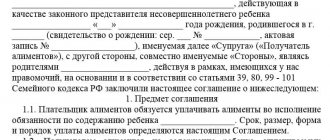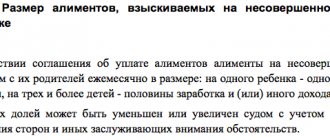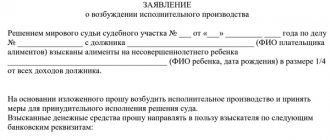In this article we will answer the question: is it possible to suspend alimony. This need arises for the payer as a result of a deterioration in his financial condition, or health problems, as well as in other situations leading to a temporary inability to make alimony payments.
Under what circumstances should you not suspend alimony payments?
But sometimes, unscrupulous payers suspend payments for their minor children without any serious reasons, which is unacceptable. After all, a minor child who does not know how to provide for himself is in great need of financial support from his parents, especially if he grows up in a single-parent family. And a parent who has left the family and abandoned his child should always remember this.
Under no circumstances should you suspend payments during the mother’s maternity leave, or in other situations when she herself will not be able to earn money to feed the baby.
Suspension of alimony by agreement
At the stage of document formation, parents can determine factors, upon the occurrence of which the alimony obligee may temporarily suspend the payment of money for minors. It should be noted that penalties and interest are not assessed for the lack of alimony during this period. Factors leading to the suspension of alimony payments include:
- the appearance of serious illness and disability in the alimony provider;
- job loss;
- significant financial losses;
- worsening political tensions in the country;
- natural disasters, catastrophes, accidents, etc.
Parents can set a condition according to which, after the financial situation has normalized, the person obligated for child support must resume paying money for the children and transfer compensation for the shortfall.
If the terms of the alimony agreement do not provide for the suspension of payments in favor of minors, then the parents can make adjustments to the document. Initially, parents need to agree on new points in the document. Next, the changes are presented on paper and certified by a notary. That is, the procedure for making changes to the alimony agreement corresponds to the original procedure for drawing up a document to withhold alimony payments.
What should a payer do when faced with such circumstances?
The payer’s actions will depend on the basis on which alimony is paid.
Such reasons may be:
- An oral agreement between the parents of a minor child. This method of raising a child is not uncommon nowadays. With such an agreement, the parent who does not live with the child pays a certain amount of money monthly or at other intervals, or gives it as needed. However, this method is not regulated by law and does not provide any guarantees to the recipient of alimony and the minor child.
- A written agreement regarding child support. Such an agreement is concluded between the payer and the second parent of the child and is notarized. The agreement establishes the amount of alimony payments, the procedure and timing for making these payments, and may also establish liability for their delay or circumstances under which the payer has the right to suspend payments for a certain period if difficult life circumstances arise.
- The court's decision. If the parties fail to agree on alimony amicably, the amount of alimony is established by the court upon the application of the alimony recipient.
In the last two cases, payments can be made by the payer:
- voluntarily , that is, by independently transferring money to the recipient’s bank account, transferring it by post, or transferring cash into the hands of the recipient;
- compulsorily , when transfers are made by deducting a certain amount from the payer’s earnings by the accounting department of the organization in which he works, on the basis of a corresponding resolution issued by the bailiff.
How to pause
The easiest way to suspend alimony payments is to agree with the claimant to defer their payment. The claimant may at any time withdraw the writ of execution presented to the bailiff. However, this option is not always available. The relationship between the debtor and the collector at the enforcement stage is, as a rule, far from friendly. Therefore, there are practically no agreements between them.
If an agreement cannot be reached, the payment of alimony may be suspended in other cases provided for by the Federal Law “On Enforcement Proceedings” No. 229-FZ of October 2, 2007.
Advice to the payer
Advice to the payer: if the relationship with the recipient of alimony is hostile, then all requests to him should be made in writing, with copies of all supporting documents attached. It is better to send such documents by valuable letters, with an inventory of the contents and a receipt. This is required so that the payer, if necessary, can prove his good faith in court.
Is it possible to suspend the collection of alimony through bailiffs? If the delay in payment is planned to be short, then the bailiffs may accommodate and allow the resulting debt to be paid within the agreed period. The same statement should be written in the organization’s accounting department, with the appropriate permission from the bailiffs attached.
Sample application for suspension of enforcement proceedings on alimony
Full name of the bailiff
FSSP Department ____ From: Full name, address, telephone (debtor)
Claimant: full name, address, telephone
Enforcement proceedings No. ___
Application for suspension of enforcement proceedings for the collection of alimony
In enforcement proceedings No. ____, initiated in accordance with the resolution of the bailiff, Full Name No. ____ dated ____, alimony is being collected from the Full Name in favor of the Full Name in the amount of _____ monthly.
The debtor hereby requests the suspension of the said enforcement proceedings due to the following circumstances. Since ____ I have been on long-term inpatient treatment in _______, the planned end date of treatment is ______. In this regard, I am in a difficult financial situation, since the amount paid for sick leave is ____, which is significantly lower than my usual earnings.
In accordance with clause 1, part 2, art. 40 of the Federal Law “On Enforcement Proceedings”, enforcement proceedings may be suspended by a bailiff if the debtor is in hospital treatment.
Based on the foregoing,
ASK:
- Suspend enforcement proceedings No. ___ for the collection of alimony for the period until the end of the debtor's inpatient treatment.
Applications:
- Medical documents confirming that the debtor is undergoing hospital treatment.
Date, signature
Collection of alimony under a writ of execution
According to the provisions of the Family Code, alimony is collected on one of the following grounds:
- Voluntary agreement to pay alimony.
The parties can agree on the amount of alimony and the procedure for collecting it by concluding a voluntary agreement. Info Based on the document, the claimant has the right to receive alimony as a percentage of monthly income, in a fixed amount, or in the form of property rights to property. In each case, the amount of alimony collected should not be less than the legally established norms (for one child - 25%, for two children - 33%, for three or more children - 50% of the defendant’s monthly income). After the voluntary agreement is certified by a notary, the document is subject to immediate and mandatory execution. - Performance list. If the parties are unable to agree on the amount of alimony, then the issue of collection of funds is considered in court.
general information
If the payment of alimony payments is made by voluntary agreement of the parties, then this document must list all the situations in which one or more transfers can be canceled without applying any sanctions to the alimony payer.
For example, the payer may require such a deferment in the event of a serious illness or loss of permanent employment. The voluntary agreement must contain a clause that provides for the possibility of making alimony payments in advance, for example, when a person goes on a long business trip.
However, with enforcement documents adopted as a result of the trial, the situation is different. According to the court order and writ of execution, payment of alimony payments must be made monthly, within the time limits established by the documents. Delay in the transfer of funds without valid reasons entails the initiation of a case.
As a rule, in such cases, fines and penalties await the defaulter, however, if there is a large debt, bailiffs can seize the debtor’s property for the purpose of its further resale.
As practice shows, bringing the guilty person to administrative or criminal liability entails significant material losses, therefore experts recommend negotiating with the payment collector if any difficulties arise in paying alimony.
If alimony is collected from the payer’s property
A defendant who does not work anywhere cannot be exempt from paying alimony. In this case, the court orders payment in a fixed sum of money. The bailiff, at the request of the plaintiff, opens enforcement proceedings and serves the relevant documents on the defendant. If the alimony obligee does not make payments, citing lack of work and wages, the bailiff has the right to seize his property, sell it, and use the proceeds to pay off the alimony debt.
During this procedure, there may also be a need to suspend enforcement proceedings. Most often this is due to the fact that the seized property is being assessed and it also takes time to sell it. The recipient has the right to file a claim for the accrual of penalties for the entire debt under the writ of execution. After completing the procedure for assessing the property and selling it, the due amount or part thereof is paid to the recipient.
The procedure for canceling alimony in court
The alimony payer has the right to file a corresponding claim in court to demand the cancellation of the financial assistance that he transfers for the maintenance of a minor child. The only condition is the provision of evidence that substantiates such requirements. It is necessary to contact the magistrate's court, which at one time made a decision on the payment.
To get the case moving, you need to collect the following package of documents:
- passport;
- copies of the child’s birth certificate and marriage certificate (its divorce);
- certificate of family composition;
- copies of documentation confirming the termination of payments;
- performance list;
- requisites.
Such a set of documents must be accompanied by a statement of claim, drawn up in accordance with all the rules. It is drawn up on the basis of Art. 394 of the Civil Procedure Code and contains: the name of the court, full names and addresses of the parties, a request to cancel payments, etc. After the judge reviews the case materials, a decision is made. Based on the results of the judicial opinion, a writ of execution is issued. This document must be submitted to the bailiff service where the proceedings were conducted. The cancellation of alimony begins from the moment the court makes the relevant decision.
The abolition of alimony is not uncommon in modern Russian family law practice. The most common reasons are: adoption of a child by another father, contestation of paternity, termination of wife support, death of the payer. Another excuse is that the recipient no longer needs financial assistance. It is worth noting that the court will always defend a minor child.
If the alimony provider does not have a strong evidence base for canceling alimony, then he can hardly count on a decision in his favor. Termination of payments is considered legal only if a decision on this is made by the magistrate court. Remember! The procedure for revoking maintenance intended for a minor child is very complex. Each case requires an individual approach. The judge conducting the case must understand all the circumstances, adequately and impartially evaluate the evidence presented, and ultimately make an informed decision. In most cases, you will need the assistance of an experienced and competent family law attorney.
Is a counter-suspension possible?
In some cases, the collector of such payments may also apply for suspension of the payment of alimony for the maintenance of a minor child. Reasons for such a decision may be:
- Second marriage.
- The mother is able to independently provide for her child.
In this case, the judicial authority will also consider all the circumstances of the case. The financial situation of both sides of production, their social status, as well as the mutual desire to come to a solution that will suit all members of this family.
As a rule, such petitions are rejected by the court, since the funds are transferred by the alimony payer for the maintenance of a minor child. And if the mother does not want to receive them, she can open a special account in which the money will be accumulated until the child reaches the age of 18, after which he will have the right to independently manage the accumulated amount.
Most often, such requests are granted only in cases where payments are made for the maintenance of other relatives, for example, when a husband supports his disabled wife. In such a situation, after being admitted to a hospital, the spouse may apply for a suspension of payments, since her maintenance in this medical institution is fully paid for and she does not need additional funds.
Complete termination of alimony payments is permitted only in the following cases:
- If one of the parties' financial situation changes.
- If one of the parties' marital status changes.
- Other situations in which it becomes necessary to cancel obligations or suspend their execution for a time.
Procedure for suspending alimony
As a rule, the initiator of the suspension of child support payments is the payer who, for some reason, is unable to make such payments. In order for this entire procedure to take place in a legal manner and not become the basis for bringing the defaulter to justice, the person must notify certain authorities about the reasons.
First of all, the citizen concerned must file a petition containing all the evidence in his possession. It is necessary to take into account the fact that after the relevant court decision is made, all alimony payments must be made according to the established schedule. Accordingly, all debts incurred without proper notification must be paid in full, taking into account penalties and fines.
One of the reasons for suspending alimony payments is the loss of a permanent job by the alimony payer. To do this, a person must first contact the Employment Center to apply for unemployment benefits for the period of employment. Of course, the amount of such a payment is several times less than the usual monthly earnings, so a person has the right to go to court to suspend the deductions until he finds a new job.
If, during the analysis of the submitted documents, the judge considers the reasons for the suspension to be valid, the payer will be assigned such temporary relief. In this case, payment of funds for the maintenance of a young child will be the responsibility of the social insurance fund, and the money will be transferred from public funds. However, the amount of such payments may be several times less than the previous ones, since the calculation of alimony will be made based on the average wage in this region of the country.
Suspension of alimony payments is possible only in cases where the funds are intended to support a minor child. In all other cases, suspension of obligations is not allowed, and the executive document is canceled.
Reasons for refusing alimony
There can be many reasons for formal refusal of alimony collection:
This is important to know: In what cases can parents apply for child support for their children?
- Most often, psycho-emotional factors occur when one parent simply does not want to communicate and see the other. But this is not at all a reason to infringe on the rights of the child;
- The potential payer himself may demand to renounce financial claims, blackmailing the other with any of his possible actions (inactions). For example, a refusal in the future to take a child outside the Russian Federation, deprivation of parental rights by publishing some scandalous information;
- An oral promise by the other parent to voluntarily help support the joint child;
- A one-time payment of a large sum that supposedly can cover all future expenses. Or the transfer of some property of significant value: a house, apartment, land plot, etc.;
- High income of the legal representative with whom the baby remains.
This, of course, is a weighty reason, but the level of income of both parents does not in any way affect their equally legal obligation to provide financially for their child.
Each situation is individual. And therefore, all parents decide on their own whether to collect child support or not.
Attention! None of the above reasons can serve as a legal basis for refusing child support. Everything that mother and father do by mutual agreement has nothing to do with the rules of law and remains purely on the conscience of these people.
We describe typical ways to resolve legal issues, but each case is unique and requires individual legal assistance.
To quickly resolve your problem, we recommend contacting qualified lawyers on our website.











